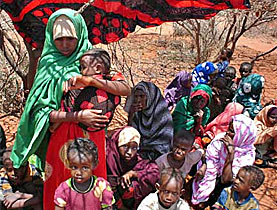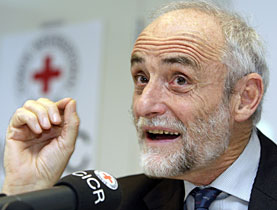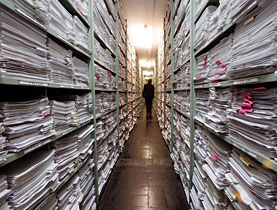ICRC sounds alarm over food prices

The Swiss-run International Committee of the Red Cross (ICRC) warns rising food prices are hurting the poorest in war zones.
Presenting the ICRC’s annual report in Geneva on Tuesday, president Jakob Kellenberger said soaring food prices were leading to more victims dependent on food assistance and a growing potential for food-related violence.
Millions of people affected by armed conflicts will be hit hard by the global food crisis, according to the ICRC, which announced that 2008 would be a year of “very high expenditure” for the organisation.
“The recent rise in food and fuel prices is making life even harder for poor people already struggling to cope with the effects of war and internal violence,” Kellenberger said.
There have been historic spikes in the price of certain staple foods over the past year. The price of rice has doubled since January, while the cost of dairy products, soya beans, wheat and sugar have also seen large increases.
The world’s poor have suffered most, sending a wave of unrest and instability around the globe. Thirty-seven countries have been hit by food riots so far this year, including Cameroon, Niger, Egypt and Haiti.
Most of the debate so far on the food crisis has focused on boosting aid to poorer countries, said Kellenberger, but he warned of “the potential of food-related violence”.
“The food crisis can degenerate into new situations of violence and armed conflict,” he said.
The ICRC highlighted the situations in war- and poverty-stricken countries such as Somalia, Afghanistan, Yemen, Chad and Haiti.
Fund appeals
For 2008 the organisation plans to spend SFr1.05 billion ($1.02 billion) on its relief and protection operations around the world and another SFr160 million on headquarters’ administrative costs. The food assistance budget will almost triple from SFr36 million to SFr100 million.
So far this year the ICRC has already appealed six times for additional funds to expand its operations: Somalia (SFr55 million); Sudan (SFr20 million), Yemen (SFr8.5 million); the Democratic Republic of the Congo (SFr8 million); Mali-Niger (SFr4.5 million) and Kenya (SFr15 million).
The situation in Somalia is particularly dramatic. “The population is already extremely vulnerable, then on top of this you have an armed conflict, a drought, a 50 per cent depreciation in local currency and rising food prices,” Kellenberger said.
In 2007 a Somali family of five spent $60 a month on food, but now has to find $120 a month, explained the ICRC.
The additional SFr55 million for Somalia would allow the organisation to provide half a million extremely vulnerable people with food for four months.
In 2007, as one of the few humanitarian organisations operational in Somalia, the ICRC stepped up its relief operations throughout central and southern Somalia. Together with the Somali Red Crescent Society, it distributed relief goods to 866,000 displaced people and food rations to 456,600 displaced and near-destitute farmers.
Detainees
Protection activities are also increasing. Worldwide last year the ICRC visited 2,400 places of detention in 77 countries holding more than 500,000 detainees. Those include suspects detained at the US naval base at Guantanamo, Cuba, and at US prisons in Iraq and Afghanistan.
“The aim of such visits, based on a confidential dialogue with detainees and the detaining authorities, is to prevent detainees from disappearing or being ill-treated and to ensure that they have decent conditions of detention,” the ICRC said.
Questioned about the possibility of visiting Iraqi-controlled prisons, Kellenberger explained that the Swiss-run organisation still does not have access.
And despite authorisation by the Myanmar authorities to carry out repairs to ten detention centres in the country, discussions with the military junta to gain access to prisoners and assist people in the border zones have not advanced, he added.
swissinfo, Simon Bradley in Geneva

More
International Committee of the Red Cross
In 2007 the ICRC provided food for more than 2.5 million people and emergency supplies such as tents and blankets for almost four million people.
Its water, sanitation and construction projects supported 14.3 million people.
Around 2.9 million, more than half of them children, benefited from ICRC-supported health care facilities.
ICRC delegates visited 518,277 people deprived of their freedom in 2,425 places of detention in 77 countries.
In collaboration with National Red Cross and Red Crescent Societies around 485,000 messages were exchanged between family members separated by hostilities and other crises.
In 2007 total field expenditure amounted to SFr944 million.

In compliance with the JTI standards
More: SWI swissinfo.ch certified by the Journalism Trust Initiative




You can find an overview of ongoing debates with our journalists here. Please join us!
If you want to start a conversation about a topic raised in this article or want to report factual errors, email us at english@swissinfo.ch.